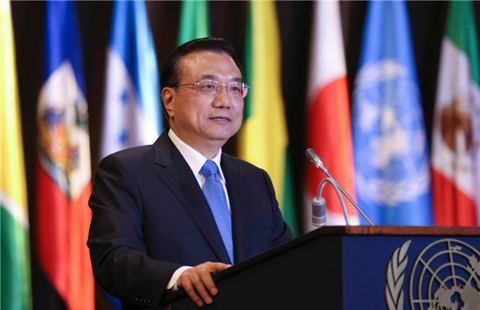White paper outlines China's 'active defense' strategy
Updated: 2015-05-26 19:04
(Xinhua)
|
||||||||
BEIJING -- China issued its first white paper on military strategy on Tuesday, stressing "active defense" and pledging closer international security cooperation.
The white paper, "China's Military Strategy", issued by the State Council Information Office, outlined a strategy unifying strategic defense and operational and tactical offense.
The nearly 9,000-word paper also underscored "the principles of defense, self-defense and post-emptive strikes", adding that China "will not attack unless we are attacked, but we will surely counterattack if attacked".
In response to the evolving form of modern warfare and national security requirements, focus will be placed on "winning informationized local wars".
"The adjustment is necessary as long-range, precise, smart, stealthy and unmanned weapons and equipment are becoming increasingly sophisticated, and outer space and cyberspace have become new command posts," said Yan Wenhu, a researcher with the Academy of Military Science (AMS) of the Chinese People's Liberation Army (PLA).
The armed forces will get better at operations based on information technology, the paper said.
They will also strengthen international security cooperation in areas considered especially important to China's overseas interests.
The paper goes on to highlight four "critical security domains": the ocean, outer space, cyberspace and nuclear force.
The PLA Navy will gradually shift its focus from a sole strategy of "offshore waters defense" to a combined one of "offshore waters defense and open seas protection".
The country will expedite the development of its "cyber force" to tackle "grave security threats" online.
China opposes a space arms race and vowed to secure its space assets.
The paper also underscored that China will never enter into a nuclear arms race and pledges to continue to contribute to world peace.
China's armed forces will lend more international peacekeeping and humanitarian assistance, under the plan.
ACTIVE DEFENSE
While this is the ninth defense white paper issued by China since 1998, it is the first to narrow in specifically on strategy, rather than the broader facts and figures of the country's military.
It focuses on the core and most sensitive questions concerning China's military and security policy, said Wen Bing, an AMS researcher.
China's socialist nature, fundamental national interests and the objective requirement of peaceful development all demand adherence to active defense, according to the paper.
"Some countries adopt preemptive strategies, emphasizing preventive intervention and taking initiative in attack. Ours is totally different," said Zhang Yuguo, senior colonel with the general staff department of the PLA, at a press conference on the white paper.
Being "active" is only a kind of means and "defense" is our fundamental purpose, he said.
It's because of adherence to this strategy that China has been able to enjoy a relatively stable environment for development and win international respect, said Chen Zhou, director of the national defense policy research center under the AMS.
No matter how strong China becomes, it will never deviate from this strategy and will not pursue military expansion, Chen said.
China opposes hegemony and power politics in all forms and will never seek expansion, according to the paper.
In response to a question from a foreign correspondent at the press conference, Defense Ministry spokesperson Yang Yujun said China has not built any military bases overseas.
Earlier this month, foreign media reported that China was building a permanent military base in the African country of Djibouti.
INCREASING THREATS
A world war is unlikely in the foreseeable future and the international situation is expected to remain generally peaceful, the paper noted.
However, it also warned of the outside threats of hegemony, power politics and "neo-interventionism".
Small-scale wars, conflicts and crises are recurrent in some regions. Therefore, the world still faces both immediate and potential threats of localized wars, according to the white paper.
China remains in a period of strategic opportunities for development, but it also faces multiple and complex security threats, as well as increasing external challenges. This means China still has the arduous task of safeguarding national unification, territorial integrity and development interests, according to the paper.
It warned of threats to China's maritime rights and interests, citing the provocative actions of some offshore neighbors, including reinforced, and illegal military presence in Chinese territory, and outside parties involving themselves in South China Sea affairs.
Yang labeled recent incidents in the South China Sea, including a U.S. military jet's controversial reconnaissance in the area, "old tricks" used to stir tensions and smear the reputation of Chinese armed forces.
The Navy has had to deal with the reconnaissance operations of U.S. warships and aircraft in Chinese territory around the South China Sea for a long time, he said. "Our responses are always necessary, legal and professional."
Characterizing the China-U.S. relationship as "generally favorable", Yang said the armed forces of the two countries had a common understanding.
As for the disputes between the two sides, he said China expects the United States to respect its core interests and major concerns and hopes that the two sides can work together to consolidate trust and manage their differences.
"China is working toward establishing positive interactions with the United States in the Asia-Pacific region and hopes that other countries in the region will jointly safeguard peace, security and stability," the spokesperson added.
China will strengthen defense dialogues, exchanges and cooperation, with the U.S military, according to the paper.
It said China will also continue to refine mechanisms for notifying other countries about planned military activity and codes of conduct for air and maritime encounters, so as to strengthen mutual trust, prevent risks and manage crises.
BLUE-WATER NAVY
The Chinese navy kept troops close to land from the 1950s to the end of the 1970s under the strategy of inshore defense. Since the 1980s, the Navy has realized a strategic transformation to offshore defensive operations.
The shift in the PLA Navy's focus to a combination of "offshore waters defense and open seas protection" is essential as China is facing rising challenges from the sea and the country is more reliant on maritime resources and energy, said Yu Miao, another AMS researcher.
The traditional mentality that control of the land is more important than control of the sea must be abandoned, and great importance has to be attached to managing the seas and oceans and protecting maritime rights and interests, said the paper.
The PLA Navy will enhance its capabilities for strategic deterrence and counterattack, maritime maneuvers, joint operations at sea, comprehensive defense and comprehensive support.
"Open seas protection" means that the navy should cooperate with other nations' forces in the open seas so as to achieve the common security of the international community, said AMS researcher Zhao Dexi.
"The new strategy does not change the defensive nature of the PLA Navy or China's resolution to safeguard world peace," Zhao said.
The navy has carried out escort missions for about 6,000 fleets from China and other countries. It has also sent its hospital ship, "Peace Ark", to Asian and African countries. Warships have been deployed to help evacuate citizens of China and other countries from conflict-hit Libya and Yemen in recent years.
It will become normal for China's navy to have a strong and diverse presence in the open seas, Zhao added.
Answering a question about China's only aircraft carrier, the Liaoning, and the possibility of it building another, spokesperson Yang said the Liaoning was conducting trials and military training.
He said at the press conference that China's aircraft carrier plan would take into consideration a complex set of factors, including economic and social development, as well as national defense and military construction needs.

 California oil spill takes toll on marine mammals
California oil spill takes toll on marine mammals
 Ten photos you don't wanna miss - May 27
Ten photos you don't wanna miss - May 27
 Family photos for mountain-dwellers
Family photos for mountain-dwellers
 A young part-time chauffeur on the road
A young part-time chauffeur on the road
 Death toll from heat wave in India nears 800
Death toll from heat wave in India nears 800
 Tech giants shine on Intl Big Data Expo 2015
Tech giants shine on Intl Big Data Expo 2015
 Premier Li urges production capacity co-op between China, LatAm
Premier Li urges production capacity co-op between China, LatAm
 US honors war dead on Memorial Day
US honors war dead on Memorial Day
Most Viewed
Editor's Picks

|

|

|

|

|

|
Today's Top News
China cautions US over
South China Sea
China, Cuba emphasize confidence
Storms kill 16 in Texas, Oklahoma; Houston flooded
Obama to host South Korea's Park in mid-June
California oil spill takes toll on marine mammals
China issues first white paper on military strategy
China, Chile ink multi-billion-USD currency swap deal
Cleveland, US Justice Dept reach settlement over police
US Weekly

|

|






